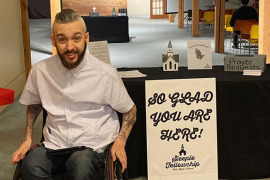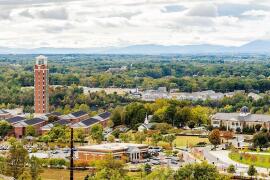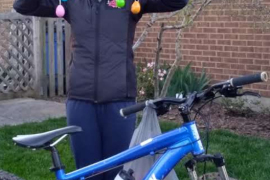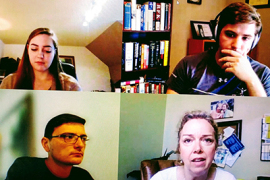Why is Autism Called a Spectrum Disorder? Expert Shares Tips for Helping Parents of Kids with Disabilities
An increasing number of children in the United States are being diagnosed with autism spectrum disorder (ASD). In fact, the Center for Disease Control estimates that 1 in 59 children has been identified with ASD, defined as a developmental disability that can cause significant social, communication, and behavioral challenges.
In light of these rising numbers, it’s clear that the need to provide beneficial education for students with autism and resources for their families cannot be underestimated. To best do this, teachers and educators must exhibit more than just clinical knowledge regarding the diagnosis. Rather, they need to show they value and care for their students as individuals, an expert has argued.
“Let’s think about the parent that’s struggling with accepting that their child has a disability or has autism,” said Dr. Deanna Keith, Director of Special Education at Liberty University. “If we think about a teacher who’s going to impact us, it’s not going to be a teacher who calls us in once a year to have a meeting. It’s going to be the teacher who has worked to build a relationship that will encourage, influence, and build trust with the parent.”
Keith contended that true credibility is only established once a parent believes an educator is looking out for their child’s best interest.
“When a teacher is speaking hard truths to parents about their child and saying, ‘We need to discuss this possibility of a disability,’ what a parent wants is not to know that you know the content area — but that you care about their child, that you’re on the same team, that you’ll come alongside them and partner with them, that you’ll communicate, that you love them,” she explained.
“It’s so important, and we really focus on that. We look at how we as teachers can impact families and parents. So many times, it’s that relational aspect to really let them know you love their child,” she added.
Keith’s passion for raising awareness and promoting acceptance of individuals with autism stems from personal experience; both her adoptive brother and nephew were diagnosed with ASD at a young age.
“Very early on as a teenager, I recognized that I wasn’t just going to be a teacher; I was going to be a teacher for children with disabilities so I could help others understand [that] children with challenges and disabilities are uniquely made by God,” she said. “God really used [my brother and nephew] to bring forth this desire and calling in my life.”
She explained that researchers can confidently identify autism as a “spectrum disorder” because those with ASD can have a range of symptoms — and no two children present exactly the same way.
“What’s unique about autism is that every child presents differently,” she said. “If we lined up 100 children in this room right in front of us, and they all have an autism diagnosis, they will all present differently. If we took autism and present it in a Venn diagram model, we could see the overlap between behavior, social, and communication. If we were to take just one circle out of the Venn diagram, behavior alone might present in one child, not at all, or possibly mild behavior disorders versus a child who has significant behavior disorders and is self-injurious. And then, we can take that to communication, we can take that to social. Every child presents so differently.”
Research suggests that genes and environment play important roles in the neurological differences evident in those with autism. But relatively little is known about what causes ASD or why rates of the disorder seem to be steadily increasing, and studies often raise more questions than answers. The lack of information regarding ASD is particularly difficult for parents of children with autism, Keith said.
“When our child is sick or when we’re sick, we want the reason, we want the cause, we want to know why,” she said. “That’s really difficult for parents because when they find out their child has autism, they want to know why this happened, and yet we really don’t know why.”
Only exacerbating the problem is the amount of misinformation about autism littered across the internet and various social media platforms.
“Parents are seeking — they need support, they need resources — so they go to the world of technology, and they start looking for information,” she said. “There's so much out there that will say, ‘this caused it, when you were pregnant and did this, this is a cause, and if you do this it’ll cure your child.’ All of that is misinformation. There is no cure for autism.”
As an educator, Keith teaches her students they have an obligation to study reliable, evidence-based research regarding ASD and to share this information with parents.
“As a researcher, it’s so important to continue to look for studies that aren’t just practitioner studies or a parent sharing their story, but looking for research that’s reliable, that’s been validated,” she said. “We have a responsibility not just to educate the child, but to really support the parent and help them understand there is a lot of misinformation and guide them to reliable information and supports and resources within the community.”
Additionally, Keith reminds her students that it’s important to support families and those in the community who interact with children with autism.
“It’s important that we continue to focus our research on not only causes but also on supportive measures,” she said. “How can we best support children with autism and what does that look like? Not just in the classroom, but what does that look like in the home and in the church setting? How can everybody that has a touch point with that child look at best supporting the child and that family as a whole body?”
As she continues to research and study ASD, Keith said she’s reminded of Galatians 3:28: “There is neither Jew nor Gentile, neither slave nor free, nor is there male and female, for you are all one in Christ Jesus.”
“That really speaks to the inclusion of everybody, the inclusion of children with disabilities,” she said. “We absolutely have a responsibility to have an awareness of biblical truths about individuals with disabilities. We should see the inclusion of children with autism in our churches, in our schools, in our homes, in our community. That’s foundationally so important and a framework for my focus and my calling in life specific to autism and special education.”
Related:
Called to Counseling — Do You Need a License to Make a Difference?
>>>Request for Liberty University Online degree info now.





